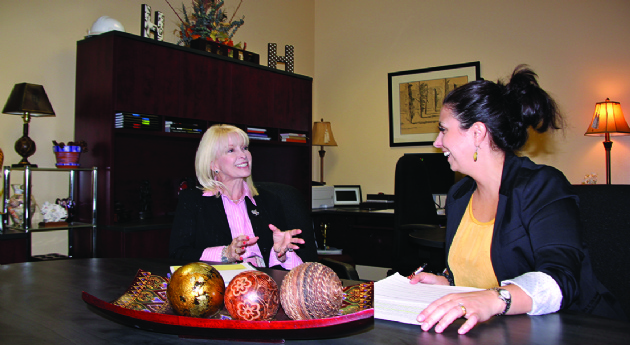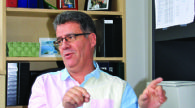You know that moment when you feel
you’ve just made a decision that is going to impact your life in a huge way,
but you’re not sure how it’s all going to turn out? That’s how Jason Wieb felt when he first
signed up for a course in the spring of 2012 at CDC Vimont, an adult education
centre of the Sir Wilfrid Laurier School Board.
Wieb, a 34 year old Rosemere resident and father of two, found himself
unemployed last year due to a layoff. Having
moved to Quebec from Manitoba at age 17, Wieb tried out the CEGEP system as a
teen, but found himself not ready to take on school at that point in his
life. “I was young and didn’t have much
interest in school, and faced with the culture shock of moving to Quebec, I was
more into rebuilding my social network,” recalls Wieb.
He worked different jobs over the 16
years that followed, but hadn’t really found his path to a career that felt
right or rewarding. After the layoff,
Wieb took the opportunity to explore a new career path. “At that time it was kind of like feeling
around in the dark,” says Wieb. Because
he was missing some courses unique to the Quebec education system, such as
French, History, Science and Math, he actually had to start by getting his high
school diploma. Within about year, not
only did he complete those courses and was awarded his Quebec high school
diploma, he also enrolled in higher Math and Chemistry, prerequisites for the
CEGEP nursing program he will soon apply to.
Wieb always felt that he could do more with his potential, and after
consulting the career counsellors and his own intuition, he chose to pursue a
career in the health field. “All the
pieces just fell into place, and right now I just have this drive and
motivation to get to where I’m going,” Wieb confides.
Behind
the Scenes
The Sir Wilfrid Laurier School Board’s
Adult Education and Vocational Training centres have been making a splash in
recent years, as student success in the job market upon completion of a program
is towering at 90 per cent. This is due
in part to the department’s commitment to offering programs of study that lead
to jobs in high demand. What’s more,
data-based research by these departments and their government partners has
revealed that employer satisfaction and job retention remains just as high
after one year on the job.
“The overall mission of our centres is
to provide high quality, state-of-the-art training to enable our students to
enter the workforce or to continue their educational careers and to be
successful,” explains Heather Halman, Director of Adult Education and
Vocational Training Services. “The
programs we offer, especially in vocational training, are all
market-driven. In other words, the idea
for our students is that they are going to go from learning to earning right away.”
Working in collaboration with the
Ministère de l’Éducation, du Loisir et du Sport (MELS) and Emploi Quebec,
Halman explains that her team studies what the current employment needs are in
the marketplace and then trains the students to meet those needs. It seems to be a recipe for success, as registrations
have more than doubled in the past two years, especially with vocational
training programs. The newest addition to program offerings, Carpentry, now has
a registration waiting list even though the program was launched less than two
years ago.
SWLSB’s Adult Education and Vocational
Training services are already far-reaching in the three northern regions of
Laval, Laurentides and Lanaudière, but the administrative team is working hard
behind the scenes to increase program offerings in more remote areas to
continue to make services as accessible as possible. With a variety of free, pre-registration
services and career counselling, it’s no wonder that adult education and
vocational training programs have become the number one resource to fast-track
a successful career in the workforce.
With over 1500 full and part time students and a team of over 100
teachers, SWLSB’s Adult Education and Vocational Training programs are worth
discovering for anyone wanting to improve their career options, acquire general
skills or simply quench the thirst for learning new things!
Adult
Education Services—Who Can Benefit?
Adult Education programs are fast
becoming a stepping stone leading to successful career paths. In the General Education department, a
student can complete courses to finish a high school diploma, take prerequisite
courses for CEGEP or a vocational training program, take language courses, or
even take a Popular Education course (such as Photography or computer software
courses). With four possible semesters a
year, registration is highly accessible and flexible scheduling is also
offered. There are satellite locations
and even distance education for certain programs. Anyone at least 16 years of age can register.
Gina Persechino—Adult Education Centre
Director for CDC Vimont, CDC Lachute and Joliette Satellite—knows that the
standard high school setting in the youth sector is not for everyone. As a former high school administrator, when she
first considered making the transition from the youth sector to adult education,
she visited some of the school board’s adult education centres. “I ran into some of my former students who
had difficulties when they were in high school, and I saw that here, they were doing very well,”
explains Persechino. “Instantly, I fell
in love [with the adult education system], and since then it’s become a passion
of mine to see students trying, turning around their lives…or to see immigrant
students get the tools they need to succeed.”
Persechino explains that the
personalization of services and courses is what makes the students feel comfortable,
supported and valued. In the past five
years, more and more students under 20 years old are coming to adult education
for a variety of services, not just for high school diploma completion. Some students come to increase their marks by
redoing a high school course so that they have a more solid application to a
CEGEP or university program. Others take
prerequisites for the same reason or to advance to a vocational training
program, and still others use the courses to fast-track their career
paths. There are also a slew of services
offered for immigrant students, whether it be language courses or programs to
assess professional competencies.
Regardless of a student’s age in adult education (from teens, to 20s,
30s and beyond), one aspect is clear; students are working toward a goal and
are supported every step of the way.
Wieb says he has no regrets about his
decision to pursue studies as an adult. “I’m
very positive about where I’ve been and where I’m going…I can’t imagine what
kind of person I’d have been without it.
This has been such a crucial turning point in my life,” he says.
Persechino has a clear message for
anyone considering adult education studies; “No matter what life dealt you when
you were younger, you are now able to choose a path for yourself, work towards
that and succeed,” says Persechino. “Our
dedicated team rebuilds self-esteem and helps students gain a positive outlook
on who they are. We teach them to trust
themselves and others. That is the
backbone of our success. Try us out!”
Vocational
Training—Who Can Benefit and Where Does it Lead?
A Diploma in Vocational Studies (DVS) or
an Attestation of Vocational Specialization (AVS) are available at SWLSB’s
vocational training centres at CDC Pont-Viau, CDC Repentigny and CDC
St-Eustache. There are over a dozen
programs of study available in multiple fields, such as Nursing, Hotel
Reception, Accounting, Carpentry and Industrial Construction & Maintenance
Mechanics to name just a few.
Several of these programs are offered
with fast-track opportunities in collaboration with Vanier College and College
Montmorency, allowing credits to be recognized toward a Diploma of College
Studies (DEC), reducing the time it would take to graduate from a CEGEP
program. With modern, state-of-the art
facilities available at each CDC, coupled with on the job training, a DVS or
AVS program is a sure-fire way to advance career opportunities or to
reintegrate the workforce in a new field.
“The biggest payoff is when students
come and tell me that we’ve changed their lives,” says Jules Goulet, Vocational
Training Centre Director for CDC Pont-Viau, CDC Repentigny and CDC St-Eustache. Over the past three years, the vocational centres
have seen student enrollment nearly triple.
As younger students enroll in vocational
training programs more than ever before, Goulet says that it’s just as
important to teach the trade skills as it is to teach the life skills required
to obtain and keep a job. “We have to
get students ready to be on the job market as soon as they finish their
program,” explains Goulet.
Savuth Khoun, a former Vimont resident,
experienced first-hand the employment opportunities available to him once he
graduated from the Hotel Reception vocational training program in 2004. During his studies, he was supported by
SWLSB’s partner, Emploi Quebec, so that he could focus on his studies full time
and really succeed at his internships. “Watching my teachers and listening to
what they had to say was amazing!” says Khoun.
“My teachers had over 20 years of hotel experience behind them—they were
really like mentors…That was a big point of change for me.”
Khoun, now 33, has been working in hotel
reception since he graduated, and says he found employment after a very short
job search period. His studies
completed, Khoun worked at two prestigious Montreal hotels, including a
five-star establishment, before landing his current position as valet-concierge
at a hotel in the Old-Montreal area. Khoun
says he’s proud of what he has been able to accomplish. As a former professional
break-dancing/hip-hop dance instructor, Khoun knew he wanted to pursue a field
that allowed him to use his social skills and ease working with the
public. Once Khoun completed his high
school courses in adult education in 2003, he then took an orientation class
that helped him match his personality to a vocational program.
“Though it can be hard, the important
thing is to think positively and to not give up. No matter what age you are, there is always
time for studies,” says Khoun. Khoun had
such a positive experience with his Hotel Reception program that he has
returned several times over the years to visit his former teachers and give
motivational speeches to their students.
Though more and more students are coming
directly from the youth sector—a trend supported by MELS in an effort to
promote the necessity of qualified tradespeople—Goulet points out that
vocational training programs are not just for those who struggled to complete
their high school education in the regular setting. Vocational training can be for anyone who is
looking to change, modify or step up their career path. “Our students WILL make a good living and
have a stimulating career,” says Goulet.
With the multitude of services available
to students at each step of the way, it’s surprising how affordable vocational
training programs actually are. The
range in program fees for students runs from $200 to $500 with programs ranging
from 22 to 60 weeks respectively. What’s
more, most of these programs are designed for immediate employment upon
graduation—a professional career awaiting—taking students right from learning
to earning in a very short time.
Getting Started
Anyone looking to improve or create
career opportunities can benefit from several pre-registration services. One such service is SARCA (Reception,
Referral, Counseling and Support Services), which provides assessments of
students’ skills and experience, as well as career exploration and ongoing
support. Even for those who don’t have a
clear career path, SARCA can help you discover career options you hadn’t
thought of before. Potential students
also have the possibility to try out a program of their choice with the “Be A Student
For A Day” service.
Another service offered is RAC
(Recognition of Acquired Competencies).
This program allows experienced workers across many fields to receive an
assessment of their skills and experience, allowing for a job promotion, securing
a permanent job in the field, earning a MELS diploma, etc.
Find out more about Adult Education and
Vocational Training at SWLSB by attending the upcoming Open House on February 5th. “It’s so important for us to really
individualize the experience for students and to make sure it’s relevant,” says
Halman. “Adult Education and Vocational
Training offers students skills for life and a career that you can take
anywhere in the world.”
About the Author;
Lisa
Cipriani is the Director of Centre Pédagogique La Renaissance, a tutoring
center in Laval that provides academic services for primary, secondary and
adult learners. As an experienced
teacher, Lisa has been working in education for almost 15 years.
www.cprenaissance.com

 In The Latest Issue:Latest Issue:
In The Latest Issue:Latest Issue:
- Celebrating Community an...
- Celebrating the Unsung H...
- Understanding Newborn St...
Articles
Calendar
Virtual- ANNUAL TEACHER APPRECIATION CONTEST
- APPUI LAVAL
- ARTS & CULTURE
- CAMPS
- CAR GUIDE
- CCIL
- CENTENNIAL ACADEMY
- CHARITY FUNDRAISING
- CITYTV
- COSMODÔME
- COMMUNITY CONNECTIONS
- COVER STORY
- DINA DIMITRATOS
- ÉCOLE SUPÉRIEURE DE BALLET DU QUÉBEC
- EDITORIALS
- ÉDUCALOI
- EDUCATION
- EMPLOYMENT & ENTREPRENEURSHIP
- FÊTE DE LA FAMILLE
- FÊTE DU QUARTIER SAINT-BRUNO
- FAMILIES
- FESTIVAL LAVAL LAUGHS
- FÊTE DE QUARTIER VAL-DES-BRISES
- FINANCES
- GLI CUMBARE
- GROUPE RENO-EXPERT
- HEALTH & WELL-BEING
- 30 MINUTE HIT
- ANXIETY
- CHILDREN`S HEALTH & WELLNESS
- CLOSE AID
- DENTAL WELLNESS
- EXTREME EVOLUTION SPORTS CENTRE
- FONDATION CITÉ DE LA SANTÉ
- GENERAL
- HEARING HEALTH
- MESSAGES FROM THE HEALTH AGENCY OF CANADA
- MENTAL HEALTH
- SEXUALITY
- SOCIAL INTEGRATION
- SPECIAL NEEDS
- TEENS
- THE NUTRITION CORNER
- THE NUTRITION CORNER - RECIPES
- VACATION DESTINATION
- WOMEN'S FITNESS
- WOMEN'S HEALTH
- HILTON MONTREAL/LAVAL
- HOME & GARDEN
- INTERNATIONAL WOMEN'S DAY
- JAGUAR LAVAL
- LAVAL À VÉLO
- LAVAL FAMILIES TV SHOW
- LAVAL FAMILIES MAGAZINE CARES
- LAVAL URBAN IN NATURE
- LE PARCOURS DES HÉROS
- LES PETITS GOURMETS DANS MA COUR
- LEON'S FURNITURE
- LEONARDO DA VINCI CENTRE
- LFM PREMIERES
- LIFE BALANCE
- M.P. PROFILE
- MISS EDGAR'S AND MISS CRAMP'S SCHOOL
- MISSING CHILDREN'S NETWORK
- NETFOLIE
- NORTH STAR ACADEMY LAVAL
- OUTFRONT MEDIA
- PASSION SOCCER
- PARC DE LA RIVIÈRE-DES-MILLE-ÎLES
- PÂTISSERIE ST-MARTIN
- PIZZERIA LÌOLÀ
- PLACE BELL
- PORTRAITS OF YOUR MNA'S
- ROCKET DE LAVAL
- SACRED HEART SCHOOL
- SCOTIA BANK
- SHERATON LAVAL HOTEL
- SOCIÉTÉ ALZHEIMER LAVAL
- STATION 55
- STL
- SUBARU DE LAVAL
- TECHNOLOGY
- TEDXLAVAL
- TODAY`S LAURENTIANS AND LANAUDIÈRE
- TODAY`S LAVAL
- WARNER MUSIC
- THIS ISSUE
- MOST RECENT
Magazine
From Learning to Earning
How Adult Education & Vocational Training Changes Lives
Articles ~e 105,7 Rythme FM 4 chemins Annual Teacher Appreciation Contest Appui Laval Arts & Culture Ballet Eddy Toussaint Camps THIS ISSUE MORE...
CONTESTS Enter our contests
CONTESTS Enter our contests
CALENDAR
Events & Activities
COMMUNITY Posts Events
PUBLICATIONS Our Magazine Family Resource Directory
LFM BUSINESS NETWORK Learn more
COUPONS Click to save!
COMMUNITY Posts Events
PUBLICATIONS Our Magazine Family Resource Directory
LFM BUSINESS NETWORK Learn more
COUPONS Click to save!
SUBSCRIPTIONS
Subscribe to the magazine
Un-Subscribe
E-NEWSLETTER Subscribe to our E-newsletter Un-Subscribe
WRITE FOR US Guidelines & Submissions
POLLS Vote today!
E-NEWSLETTER Subscribe to our E-newsletter Un-Subscribe
WRITE FOR US Guidelines & Submissions
POLLS Vote today!
ADVERTISERS
How to & Media guide
Pay your LFM invoice
SUGGESTIONS Reader's Survey Suggest a Listing
LFM About Us Our Mission Giving Back Contact Us
SUGGESTIONS Reader's Survey Suggest a Listing
LFM About Us Our Mission Giving Back Contact Us
 PICK-UP LOCATIONS
Get a copy of LFM!
PICK-UP LOCATIONS
Get a copy of LFM!
TERMS & CONDITIONS Privacy | Terms
ISSN (ONLINE) 2291-1677
ISSN (PRINT) 2291-1677
Website by ZENxDESIGN








Tweet
Share